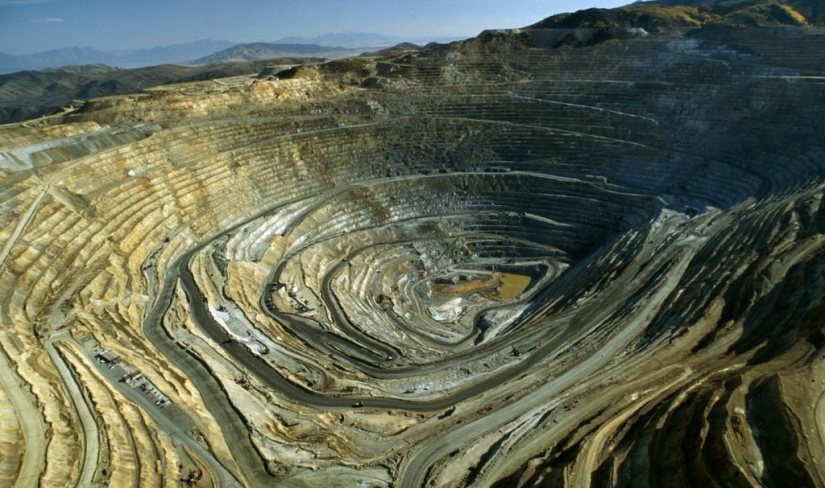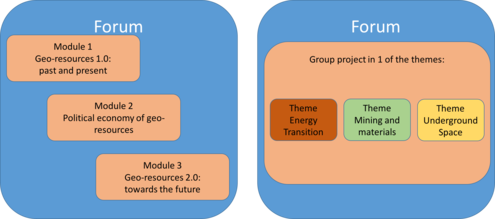Geo-resources for the Future (LDE)
Social, Economic, Environmental and Political Challenges
Geo-resources are used everywhere in our daily life, it’s not just the petrol that drives our cars and busses and the gas that warms our houses. Geo-resources are also needed to make sustainable energy sources. Rare earth metals are for instance used for solar cells, wind turbines, electric motors, and last but not least in our mobile phones.
We are facing challenges: Increasing CO2 emissions are causing climate change and call for an energy transition towards renewable energy sources. In addition, the supplies of fossil fuels and minerals are limited and their availability and prices strongly depend on global politics. In order to tackle this complex societal challenge, various viewpoints have to be considered. In this Minor, you will learn about the various disciplines that are involved in a responsible exploitation and trading of geo-resources and practice their integration. You will work on economic, environmental and social aspects that are needed to achieve a ‘licence to operate’. How is it done today and what do we need to change tomorrow? We need your active participation in group work and interactive work forms (e.g. debates, games, workshops).

Faculty of Civil Engineering and Geosciences
ECs: 30
Language: English
Maximum participants: 50
Education periods: Q1, Q2
Participating institutions
Leiden UniversityErasmus University
Delft University of Technology
For Whom?
All Bachelor students from TU Delft, Leiden University, Erasmus University Rotterdam (EUR students may follow only Q1 i.e. 15 EC)
Students from various disciplines who are interested in social, economic, environmental and political aspects of the exploitation and trade in geo-resources
What you will learn?
- A taste of all disciplines involved in responsible exploitation of geo-resources. Geo-resources are not to be let to the geologists – they are an issue of social scientists, economists, politicians, and environmentalists.
- The complex nature of extracting and trading geo-resources and what is actually needed to do this responsibly.
- How the topic of circular economy links to geo-resources.
- The technological, institutional and economical value chain per geo-resource, including historical knowledge.
- The impact of climate policies, consequences for fossil fuels and subsidies
- Hear stories from the real world and discuss with experts in the field.
- Excursions
- Build a Wiki
- Write an essay on a pressing problem (with prior essay writing workshop)
- Participate in debates
- Group project
Course overview
In Quarter 1 the minor consists of the Forum, where three modules and self-study are embedded. All modules will be given in a blended form, i.e. partly face-to-face (e.g. lectures) and partly online (e.g. part of MOOC’s, web lectures, online documents).
At the beginning, we will align the knowledge base of students from the various disciplines by guided self-studies with material provide. Knowledge acquired in the three modules will be integrated in weekly activities in the so called Forum (e.g. debates, stories from experts in the field, excursions, games, workshops).
- Module 1 Geo-resources 1.0: Past & Present (5 EC)
Geosciences and engineering aspects: what are resources, where are they found, how are they exploited; competition between use of resources, environmental impact of exploitation; historical perspective and state-of-the-art. - Module 2 Political Economy of geo-resources (5 EC)
Political economy, geo-politics, energy trading, institutional economics, governance, regulations, impact on prosperity, international relations. - Module 3 Geo-resources 2.0: towards the future (5 EC)
Energy transition, Resource Scarcity, Security of supply, Circular Economy, Geo-(risk) management, management of innovations, Social Corporate Responsibility
In Quarter 2 (optional for EUR students), students will work in groups of 4 to 5 students on a specific topic/case study. Each topic falls within one theme that combines a number of case studies; the Forum remains as a place to interact between groups.

Education methods
- Hear stories from the real world and discuss with experts in the field.
- Excursions
- Build a Wiki
- Write an essay on a pressing problem (with prior essay writing workshop)
- Participate in debates
- Group project